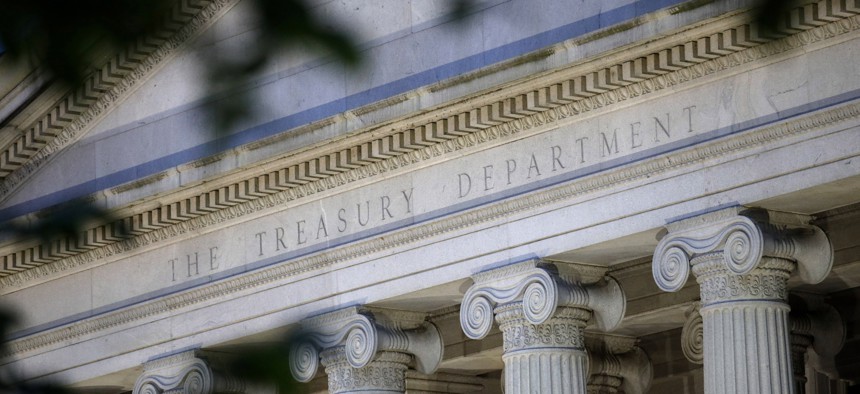Judge Declines to Block ARPA Tax Cut Mandate Before Case is Heard

This June 6, 2019, file photo shows the U.S. Treasury Department building at dusk in Washington. AP Photo/Patrick Semansky
At least six lawsuits are challenging the legality of a provision included in the American Rescue Plan Act that prevents states from using federal relief funds to offset tax cuts.
A federal judge on Wednesday declined to temporarily block the Biden administration from enforcing a provision of the American Rescue Plan Act that prevents states from using coronavirus relief funds to offset tax cuts.
Thirteen states filed a lawsuit alleging the so-called “tax mandate” provision is unconstitutional and usurps their ability to reduce the tax burden on their citizens. The lawsuit is one of at least six, involving a total of 23 states, challenging the provision.
U.S. District Court Judge L. Scott Coogler issued an order Wednesday that denies the states’ request for a preliminary injunction in the case. Coogler acknowledged the states have standing to sue the Treasury Department, which administers the ARPA funding. But he found the states did not meet the threshold for a preliminary injunction because they failed to show that they would suffer a substantial threat of irreparable injury without an injunction.
“The preliminary injunctive relief that they request from this Court is an order prohibiting the Secretary from exercising her recoupment powers until this Court issues a merits decision in this case,” Coogler wrote in a 25-page order. “But recoupment of ARPA funds is a quintessentially reparable injury because it can be ‘undone through monetary remedies.’”
The ARPA appropriates $195 billion in direct aid for state governments, but restricts states from using the money “to either directly or indirectly offset a reduction in the net tax revenue.” The Treasury Department has issued guidance to clarify how it will determine whether or not tax cuts violate the provision. ARPA requires states to periodically report changes in state tax revenue. If a state spends federal funding on an ineligible expense, the Treasury Department could seek to recoup the funds.
The 13 states involved in the lawsuit are Alabama, Arkansas, Alaska, Florida, Iowa, Kansas, Montana, New Hampshire, Oklahoma, South Carolina, South Dakota, Utah and West Virginia. They argued that the Treasury Department rules are overly broad and that any number of tax changes their state legislatures are considering could run afoul of the rules.
“Combined with ARPA’s claw-back and other enforcement provisions, the broad and ambiguous scope of the Federal Tax Mandate has the likely and foreseeable effect of chilling almost any legislative action by the States that affect tax revenue,” the states wrote in their original complaint.
But Coogler said that a preliminary injunction wouldn’t alleviate states’ concerns.
“The Plaintiff States will still have to take into consideration, when accepting the ARPA funds, that the funds are subject to possible recoupment if this Court were to ultimately issue a merits decision declining to issue a permanent injunction,” he wrote. “Thus, granting a preliminary injunction in this case does nothing to remedy the Plaintiff States’ alleged harm.”
In addition to the 13 states, other states have filed lawsuits to challenge the tax mandate provision. In contrast to Wednesday’s decision, Ohio scored a victory earlier this month when a federal court ruled that the tax mandate language was too ambiguous to pass muster under the U.S. Constitution's Spending Clause.
Despite the ongoing litigation over the tax mandate provision, some states have forged ahead with tax cuts. In Idaho, state legislators approved a package of $163 million in tax cuts and $220 million in rebates this year confident that any revenue reductions would be offset by economic growth.
Andrea Noble is a staff correspondent with Route Fifty.
NEXT STORY: How State Finances Fared During the Covid-19 Crisis





